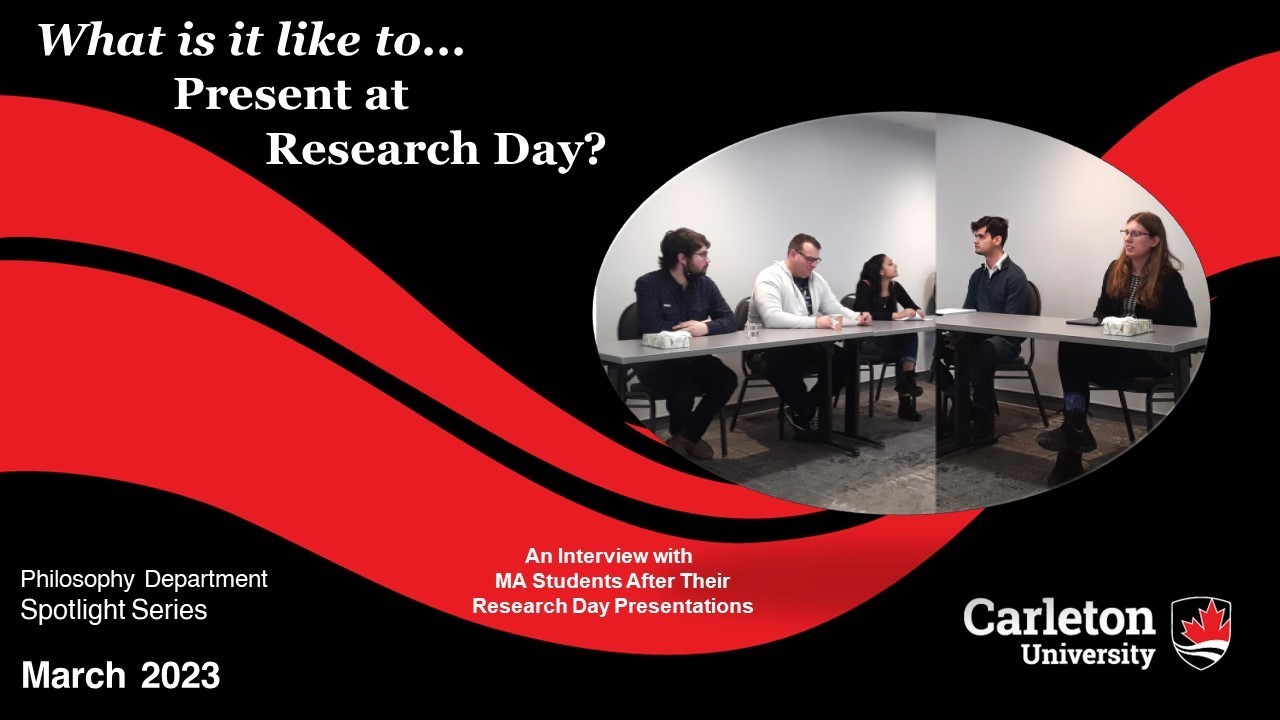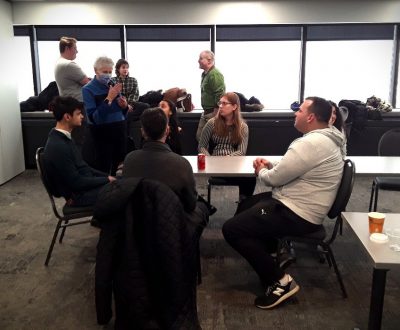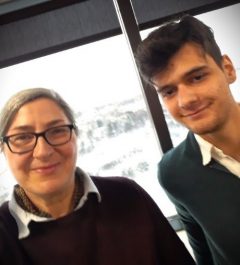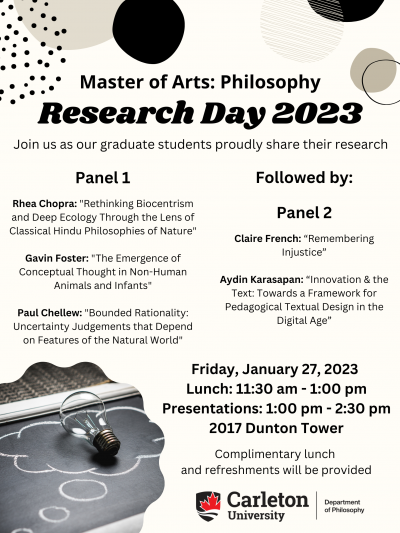What is it Like to Present at Research Day? An Interview with our MA Students

Meet Philosophy Master’s students Paul Chellew, Rhea Chopra, Gavin Foster, Claire French, and Aydin Karasapan! Recently, these five students participated in our department’s annual Research Day event, where MA students volunteer to present their current research to the whole department.
Research Day has been one of the department’s most cherished traditions for two decades. We asked our students, and Professor Christine Koggel, Graduate Supervisor and coordinator of this event, questions about their Research Day experience. Take a look!
Professor Koggel, could you briefly explain Research Day and what its goals are?
Professor Christine Koggel: Research Day is a great opportunity for MA students to present their research projects and for faculty members and prospective students to learn about what our MA students are working on. It is usually organized into two panels each with 2 or 3 students presenting their research. Each panel is followed by a 15-20 minute Q&A session. Both the presenting and the answering of questions helps students make sure their projects are accessible and it gives them a line on their CVs!

This was our first year hosting an official, in-person Research Day event since the pandemic began. Was this return a success? Did returning pose any new or unforeseen challenges?
CK: The return of the in-person Research Day was an unqualified success. I was so proud of our MA students! Each of the five did a wonderful job presenting their projects in just 5 minutes! I was also very pleased that a good number of faculty members and other students attended and that the Q&A parts were lively, engaging, and spot on in the questions the audience members asked the presenters.
Paul, you work on a complex project on rationality and intuition. Tell us what was it like to be surrounded by your fellow cohort and past professors as you presented your project? Was it invigorating to have them, as well as your advisor, Professor Matheson, in the room as you shared some of your research?
Paul Chellew: After I took a moment to breathe and put all my catastrophic worries aside, the event was very enjoyable. I initially felt as if there was an audience of philosophically equipped people in front of me, prepared to dismantle every aspect of what I was working on. Of course, that was a function of my anxiety. What I actually experienced was a room full of support from classmates and faculty offering thoughtful questions and their genuine interest. Professor Matheson has been tremendously supportive since the beginning of this project, and even before its beginning, as he helped me conceive it. His presence helped me to get over the initial jitters. It was also nice to give a well–received presentation that I can only hope was as affirmational for his efforts as it was for mine.
Rhea and Aydin, you are both doing unique projects. Rhea, you are exploring how Hindu philosophy can provide novel approaches to issues of biocentrism, and Aydin, you are working on ways that a more digital age may demand philosophically informed pedagogy. Five minutes is quite short to present innovative projects like yours! How was it to share your research with the department? Did you see value in the exercise and were there any specific challenges?
Rhea Chopra: It was definitely challenging to keep my presentation down to 5 minutes. Since my research focuses on one specific sub-school in Hindu philosophy, i.e., Vśishtādvaita Vedānta, with which the audience is largely unfamiliar, I had to decide what background of key concepts, terms, and significant philosophers was necessary for making the presentation intelligible. Having to explain this necessary background concisely while still having time to explain how Vśishtādvaita Vedānta can contribute to conversations surrounding theories of biocentrism was definitely a valuable exercise!

Aydin Karasapan: Condensing my research into a five-minute presentation was definitely challenging. It forced me to distill my research down to its core, and to make it accessible to people who are unfamiliar with my work. It was difficult to avoid compromising between doing justice to the project as a whole with being clear and brief. In the end I think it worked out and I was able to distill my ideas into an effective presentation. Overall, I think narrowing down and condensing such a large project is always going to be tricky but can also be rewarding.
Gavin, you have now presented twice to the broader Carleton philosophy community, even though it is only your first year in the MA program! This is very impressive. How has the feedback from your professors and peers, which you received during Research Day and the EPAF conference, helped you to move forward with your project?
Gavin Foster: It was wonderful to present at Research Day and share the ideas that I have been investigating and grappling with for a long time. I am fortunate that the Carleton philosophy department is so diverse and that the feedback not only helped me refine my own thoughts, but provided me the opportunity to reconsider the philosophical issues I am interested in from a variety of methodological backgrounds. Further, listening to the other panelists’ research made me realize how much overlap already exists! Even the process of preparing for the Research Day was itself a rewarding experience, forcing me to think hard about how to encapsulate my research on the emergence of mind over the past few months. I have now narrowed down my research to deal exclusively with mentalizing capacities in chimpanzees and other non-human primates—that is, the capacity for these animals to ascribe mental states to other agents.
Claire, do you think Research Day was an important event in the course of your MA program? Was it a helpful experience in building confidence to start presenting at conferences? What was the most interesting or helpful question you received?

Claire French: I’m a relatively experienced public speaker, but I’ve never had the chance to speak before a group of academics about my personal research. So in that regard, it was helpful insofar as it gave me an opportunity to build confidence in my ability to speak clearly and concisely about my work. The most interesting question I received was about the right to be forgotten. Since my research is largely about which things should be remembered but aren’t, I hadn’t really considered the positive value of forgetting things.
You are supervising Claire’s project, Professor Koggel. How did it feel for you, as a supervisor and as the department’s Graduate Supervisor to see Claire and other MA students share their research publicly?
CK: To say I was proud of Claire and the other MA students is an understatement. Claire came across as confident and well-versed in the literature she is exploring for her complex project that examines an account of memory as relational to better understand the harms of epistemic injustice and how to address these. The Q&A sessions revealed that the audience connected with Claire’s project and the other MA projects as well. To me, this was a good indication of how well the students did on Research Day and how well they are doing in the MA program.
Thanks again to all of you for speaking with us! We know those who attended enjoyed hearing about your work, To close, can you tell us what you think was the biggest benefit of Research Day for you?
PC: Philosophy can be a solitary endeavor. It certainly has been for me, as I am in the final stages of a thesis project. Research Day was a wonderful reminder of all of the support we students have from within the department and a great opportunity to share my research with people that seem genuinely interested in what I was working on. I know this is starting to sound like a testimonial on an advertisement, but Research Day was a great experience.

RC: Sharing my research with other members of the department and listening to their questions and comments was a great opportunity! Since our department has such a wide range of research interests, it was nice to hear different perspectives and consider questions that I hadn’t before. I also really enjoyed listening to my peers’ presentations and hearing about all of their interesting projects!
AK: One of the biggest benefits of Research Day for me was the opportunity to practice and improve my presentation skills. However, I was pleasantly surprised to find that condensing my research into a clear and accessible format helped me clarify my own thinking about my work. By narrowing down my project I was able to better organize and structure my research. Overall, it was an incredibly valuable experience that I would recommend to others.
GF: It is always wonderful when the entire department is present to help exchange and stimulate new ideas. Research day allowed me to situate myself relative to other areas of philosophy. The diversity of thought and background has assisted me in looking at a variety of issues related to animals from different perspectives, which only improves my own understanding of the problems.
CF: Writing a thesis can be a pretty isolating activity, so I found that having a chance to engage in meaningful dialogue with more experienced academics in person allowed me the opportunity look at my project through fresh eyes.
Thanks to our students for answering our questions. You can find more about our MA students by checking out the student profiles section of our website here. Stay tuned for our next Spotlight article in April 2023!
